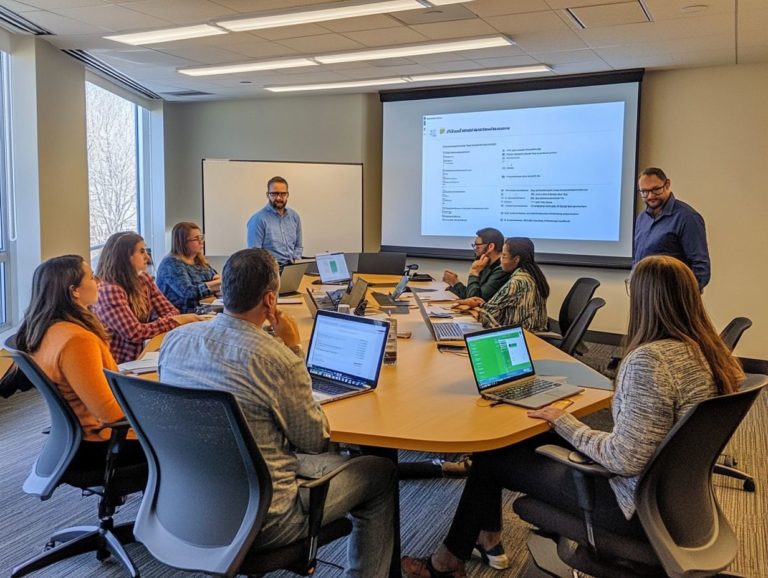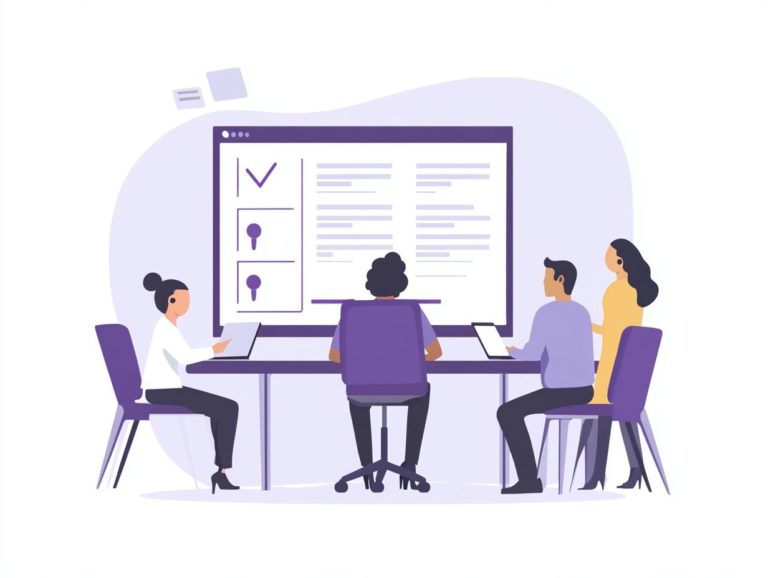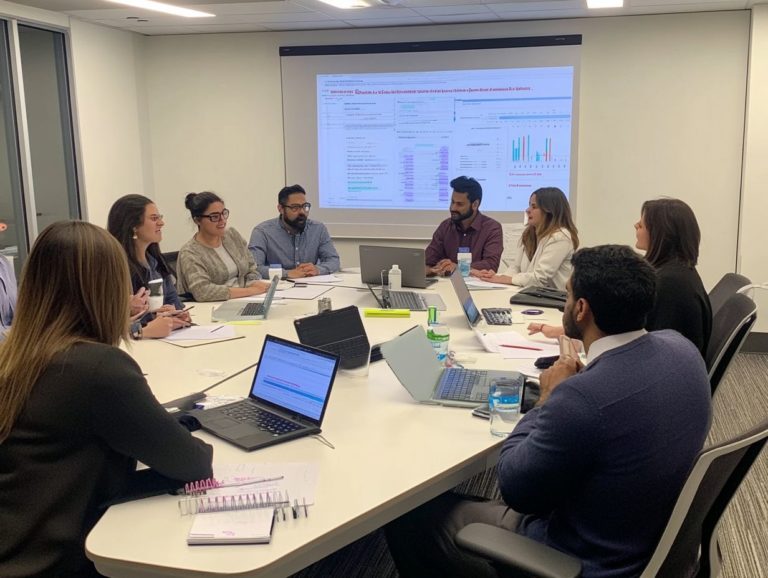“Creating Engaging CRM User Training Content”
In today s fast-paced business environment, training on CRM systems is vital for you and your business not just for individual users, but for organizations as a whole.
This article delves into the myriad benefits of CRM user training. It guides you through the process of identifying skill gaps and designing engaging content that keeps users motivated.
It also covers various delivery methods, key metrics for measuring success, and the critical role of ongoing education.
By the end, you will have a clear understanding of how to craft a training program that empowers users and propels organizational success.
Contents
- Key Takeaways:
- The Importance of Effective CRM User Training
- Identifying Training Needs
- Designing Engaging Training Content
- Delivering Training Effectively
- Measuring Training Success
- Continuing Education and Refresher Training
- Frequently Asked Questions
- What is the importance of creating engaging CRM user training content?
- How can I make my CRM user training content more engaging?
- What are some common mistakes to avoid when creating CRM user training content?
- How can I ensure that my CRM user training content is effective?
- What role do visuals play in creating engaging CRM user training content?
- Is Ongoing CRM User Training Necessary?
Key Takeaways:

Effective CRM user training benefits both individuals and organizations by improving knowledge and skills.
Conduct a thorough assessment of user knowledge and skill gaps to identify training needs.
Engaging training content can be achieved through interactive elements and strategies to keep users engaged.
The Importance of Effective CRM User Training
Effective CRM training is crucial for your success. It significantly impacts productivity, employee engagement, and customer satisfaction.
High-quality CRM training sharpens your skills and gives the power to CRM administrators to fully harness the potential of customer relationship management systems.
By adopting a well-structured training approach, you can ensure that your organization optimally utilizes CRM tools. This leads to improved data management, more accurate reporting and analytics, and ultimately, enhanced customer service that seamlessly aligns with your company s sales processes.
Benefits for Individuals and Organizations
The benefits of CRM training are huge! It enhances user management and significantly boosts performance metrics.
By pursuing CRM certification, you gain advanced skills that elevate your career prospects. You can also harness data analytics for improved decision-making.
For instance, you could see your earning potential rise by as much as 20% after completing the training. Organizations that invest in this training often see a notable improvement in customer satisfaction.
By adopting systematic CRM practices, teams become adept at identifying customer needs and streamlining processes, driving overall success.
Identifying Training Needs
Identifying training needs is crucial. Every user role within the CRM system must possess the skills required to keep your data accurate and reliable.
By assessing these needs, you empower your team to utilize the system effectively, paving the way for improved outcomes and streamlined operations.
Assessing User Knowledge and Skill Gaps
Assessing your team’s knowledge and pinpointing skill gaps is essential for crafting a CRM training plan that truly meets their specific needs.
Surveys can gather invaluable user feedback about their comfort level with the CRM software, while quizzes can effectively gauge their understanding of various functionalities.
Role-play exercises provide practical scenarios where users apply their skills in real time, allowing you to observe their interactions and decision-making processes.
By analyzing the outcomes of these assessments, you can tailor your training strategies, ensuring that sessions address knowledge gaps and refine data management practices vital for boosting overall user proficiency.
Designing Engaging Training Content

Designing engaging training content is crucial for effective user training. By capturing the attention of marketing professionals and other users, you ensure they not only grasp the material but also achieve data accuracy and meet important performance goals.
This thoughtful approach elevates the learning experience and drives success.
Start your CRM training journey today for immediate benefits!
Strategies for Keeping Users Engaged
Effective training strategies keep you engaged during CRM training. Methods like gamification can make learning exciting.
This approach encourages you to advance through various levels while earning rewards along the way. Role-play exercises create a hands-on environment where you can practice real-world scenarios. This significantly boosts your confidence and competence.
Customizable training plans cater to your unique needs. They allow you to concentrate on the areas that require improvement. These strategies enhance your training outcomes and foster a culture of continuous improvement, motivating you to view your development as an ongoing journey.
Utilizing Interactive Elements
Interactive elements within CRM training can significantly elevate your learning experience and enhance your performance results.
By incorporating simulations, quizzes, and hands-on exercises, the training transforms from a passive activity into an engaging journey.
Simulations allow you to practice real-life scenarios in a risk-free environment. They help you grasp complex concepts with greater ease. Quizzes serve as engaging checkpoints that reinforce your learning and clarify misunderstandings. Hands-on exercises encourage you to apply your knowledge in practical situations.
Together, these methods cultivate a dynamic learning atmosphere. They improve information retention and foster collaboration and engagement, ensuring a training experience that truly makes an impact.
Delivering Training Effectively
To deliver training that truly shines, focus on a few key factors. You should thoughtfully choose the delivery method, seamlessly integrate various techniques, and consider the onboarding fee associated with bringing new users on board.
Each element plays a crucial role in ensuring a smooth and impactful training experience.
Choosing the Right Delivery Method
Choosing the right delivery method for CRM training is essential for maximizing your interface interaction and ensuring effective learning outcomes. Different user roles, such as marketing professionals and sales managers, have unique needs and preferences regarding learning environments.
E-learning platforms provide the flexibility to access materials anytime. This allows you to learn at your own pace. In-person workshops offer valuable networking opportunities and hands-on experiences that can t be replicated online.
Companies like HubSpot successfully implement blended learning approaches. They combine virtual modules with interactive live sessions, catering specifically to the diverse learning styles of their sales teams.
By assessing the specific requirements and preferences of each role, you can tailor training programs that significantly enhance engagement and retention.
Tips for Effective Delivery

To ensure the effective delivery of CRM training, incorporate best practices that enhance user understanding and meet specific performance indicators.
Actively seek feedback from users to improve your training. This helps your organization pinpoint areas needing improvement and refine your methodologies. Fostering open communication channels enables real-time questions and concerns to be addressed. This allows users to feel more engaged and supported throughout the training process.
Ensure support tickets are handled promptly. This approach resolves any issues users may encounter quickly, minimizing frustration.
Continuous analysis of training results should drive ongoing improvements. Reinforce the idea that training is not just a one-time event but an evolving journey tailored to the needs of your users.
Measuring Training Success
Measuring training success is essential for any CRM training program. It enables organizations to evaluate CRM metrics effectively and fosters continuous improvement in both data integrity and user performance.
By focusing on these measurements, you can ensure that your training initiatives yield the desired outcomes and contribute to the overall success of your CRM efforts. Start measuring your training success today to ensure your CRM efforts are paying off!
Key Metrics to Track
Tracking key metrics is crucial for assessing the effectiveness of your CRM training programs and understanding their impact on data management.
By honing in on specific metrics like user proficiency, you can determine how well your team has absorbed the training content and applied it in real-world situations.
Improvements in data accuracy become another vital indicator. This demonstrates how effectively your staff is inputting and maintaining information within the system.
Monitoring customer satisfaction levels also provides valuable insights into how well the CRM tools are enhancing customer interactions. If you notice a dip in customer satisfaction following a training session, it may indicate areas that require further refinement.
Together, these metrics create a roadmap for future training initiatives. This ensures they are finely tuned to tackle exciting challenges that can propel your team forward and support ongoing skill development.
Continuing Education and Refresher Training
Continuing education and refresher training are essential for preserving the effectiveness of your CRM training.
By prioritizing these initiatives, you ensure that users can seamlessly adapt to the ongoing changes in technology and processes. This effectively reduces any resistance to change.
The Importance of Ongoing Training
Ongoing training is essential to maintain high levels of data accuracy and employee engagement within your CRM systems. It helps you and your team members stay informed about the latest tools and integrations, giving you the power to use these technologies effectively.
By embracing continuous learning, you not only enhance your skill set; you also play a vital role in fostering a more innovative workplace culture. This kind of environment encourages curiosity and collaboration, breaking down silos and promoting better communication across teams.
As you become adept with new features and functionalities, you’ll be able to optimize workflows. This ultimately leads to improved productivity and customer satisfaction.
Investing in ongoing training allows your organization to adapt swiftly to market changes and stay ahead of the competition. Don t wait start enhancing your team s skills today!
Frequently Asked Questions

What is the importance of creating engaging CRM user training content?
Creating engaging CRM user training content is important because it ensures that users are fully equipped with the knowledge and skills needed to use the CRM system effectively. Engaging content not only keeps users interested but also helps them retain information better, leading to a more successful implementation of the CRM system.
How can I make my CRM user training content more engaging?
There are several ways to make your CRM user training content more engaging. Some effective strategies include incorporating interactive elements such as quizzes or gamification adding game-like elements to make learning fun using real-life examples and scenarios, and including visuals such as images and videos to break up text-heavy content.
What are some common mistakes to avoid when creating CRM user training content?
Some common mistakes to avoid when creating CRM user training content include using technical jargon and not tailoring the content to the specific audience. It s also important to provide enough hands-on practice opportunities. Regularly updating the content ensures it remains relevant and accurate.
How can I ensure that my CRM user training content is effective?
To ensure that your CRM user training content is effective, regularly gather feedback from users and make necessary adjustments. You can also conduct assessments or quizzes to test users’ knowledge and understanding.
Incorporating real-life scenarios and providing hands-on practice opportunities can help reinforce learning.
What role do visuals play in creating engaging CRM user training content?
Visuals such as images, videos, and infographics can greatly enhance the engagement and effectiveness of CRM user training content. They help break up text-heavy content, provide a visual representation of concepts, and make the training more interactive and interesting.
Is Ongoing CRM User Training Necessary?
Yes, ongoing training for CRM users is essential. Are you ready to unlock the full potential of your CRM?
Technology and business processes change quickly. Users must stay informed about the latest CRM features and best practices.
Regular training helps improve how the CRM system is used. This leads to greater efficiency and effectiveness.






